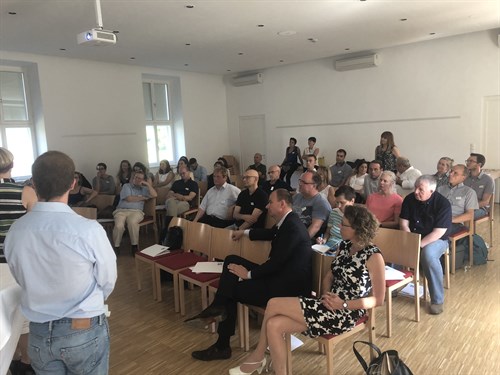We were delighted to recently host the launch of a new two-year Erasmus+ Key Action 3 project, ‘Certification and Qualification of Europe’s Job Brokers (CQJB)’.
 Earlier in 2018 we responded to a call from the EACEA of the European Commission, which invited proposals for the development of new joint European qualifications as part of its Key Action 3 support for policy reform programme.
Earlier in 2018 we responded to a call from the EACEA of the European Commission, which invited proposals for the development of new joint European qualifications as part of its Key Action 3 support for policy reform programme.
Pictured left: The CQJB partners launch the new project at their kick-off meeting in London on the 15th and 16th October 2018.
The call was very timely, as Rinova had been coordinating its Erasmus+ Key Action 2 Strategic Partnership concerned with Job Brokerage since 2015. Working with our partners in Europe, we identified how accelerating policy reform in public services is impacting on the way services are organised in publicly-funded programmes to support job-seekers. These changes are ‘pushing’ organisations and practitioners to look beyond traditional roles of ‘job coaching’ and employment counselling, and extending the skills required beyond ‘job-matching’. This requires more in-depth and direct work with the job-seeker and with employers to create – and sustain – job placements.
As we reported regularly in various news features, our Job Broker strategic partnership undertook a programme of research across the UK, Greece, Italy, Germany, Austria, Spain, Iceland and Cyprus. It went on to design a new action-learning-based curriculum, learning materials and a self-directed learning guide, all of which were designed to support the flexible, in-service professional development of Job Brokers in Europe.
 These materials were piloted and revised following a testing programme involving some 140 professionals across Europe who were working as Job Brokers or in related occupations. As well as being in English the materials have been translated into German, Greek, Spanish, Italian and Icelandic and are available via the project website and via the Erasmus+ results platform.
These materials were piloted and revised following a testing programme involving some 140 professionals across Europe who were working as Job Brokers or in related occupations. As well as being in English the materials have been translated into German, Greek, Spanish, Italian and Icelandic and are available via the project website and via the Erasmus+ results platform.
This part of our work concluded with a very successful conference in Vienna on the 6th July which was hosted by our Austrian partner, abif. This event was attended by some 50 participants, which involved 35 labour market practitioners from across Austria as well as international delegates from the UK, Italy, Germany and Ireland and the European partner representatives. At the event. Rinova’s Director Rick Parkes presented the context of ‘payment by results’ which has driven the development of the Job Broker role in the UK, as well as recent cutting-edge research from NESTA on new and forecasted skills requirements. Delegates also heard from local providers in Austria, as well as from Reiner Aster of Gsub on the development of employment service approaches over the years in Berlin, as well as from Soffia Gisladottir of VMST who outlined how the Job Broker approach was bringing parties together to improve job opportunities in a country where unemployment levels are very low.
Pictured below: Delegates at the Job Broker conference event in Vienna on the 6th July.

The programme was very positively received in each country, many of those who participated felt that the programme would benefit from having an option to proceed to some form of professional certification. Having explored how this could happen through follow-up work, we were in a good position to respond to the new Key Action 3 call, so Rinova took the initiative to design and produce the application.
As a result we were delighted to receive the news over the summer that this application had been approved. As well as Rinova, the original partners from Greece (Dimitra, which is now acting as the project coordinator), Germany, Cyprus, Iceland and Austria have been joined by a new partner from Spain, the Zaragoza Chamber of Commerce and Industry and the national educational agency Folkuniversitetet from Sweden as well as ACTA, an ISO accreditation agency in Greece.
Over the next two years, the partners will design, test and establish a new internationally-recognised professional qualification for Job Brokers that is to be accredited through ISO 17024. They will also explore how a professional certificate can be accredited for the purposes of the European Credit Transfer System (ECTS) that is used widely in Higher Education.
If you are working as a Job Broker or in a related field and you are interested in gaining this professional certificate, you can apply to join the first group that will take the pilot programme later in 2019. If you would like to put your name down for a place, or you would like to know more details when they become available, please contact Alex Walker of Rinova at a.walker@rinova.co.uk .

The European Commission support for the production of this communication does not constitute an endorsement of the contents which reflects the views only of the authors, and the Commission cannot be held responsible for any use which may be made of the information contained therein.


